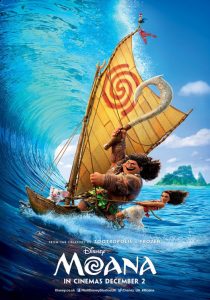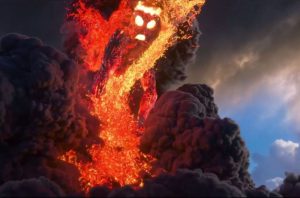
The more I think about “Moana,” the more I appreciate its simplicity. At first, I found the simple direction to be a burden. Ron Clements & John Musker felt as if they were on autopilot, supplanting the plot with just enough contrivances to get the film to its musical numbers and comedy bits. It was a pleasant experience, don’t get me wrong, but felt a little empty. The songs themselves, while vibrant, were bogged down by dense lyrics. The cutesy antics of a dimwitted chicken, the cheeky counseling from a sentient tattoo, and the sarcastic demeanor of the two protagonists were all amusing, but ran their course rather quickly. The animation was stunning, but the screenplay (credited to Jared Bush) and direction wasn’t up to par.
That is until I began thinking about the film’s message. It’s about discovering one’s inner strength and overcoming personal demons. While it takes great fortitude to be strong, the act of being so is rather simple. It is easier to love than hate, and it is that love that formulates confidence. That confidence is what drives one to overcome their fears and conquer their demons. For Moana (Auli’i Cravalho), her fears are permanence, which she feels traps her to the facile village that raised her. Her father, Chief Tui (Temuera Morrison), fears change and the dangers it presents. Maui (Dwayne Johnson) fears inadequacy and abandonment, hiding behind a cocky demeanor to mask his perturbation. All three come face to face with their fears, realizing that ignoring it only causes their demons to grow stronger and more powerful. Accepting their limitations and facing their fears gives them the power of self-worth.

This is why the villain is nothing more than a basic lava monster, hurling globs of fire and molten at trespassers. Yes, there’s more depth involved when all is revealed, but on the surface the monster is one-note. That’s perfectly fine, as the monster needn’t be developed. The story isn’t about good vs. evil, but the battle within. A physical demon is needed to visually represent our heroes overcoming their demons, but a fleshed-out villain with motives is extraneous. It was this rudimentary monster that opened my eyes to the beauty of “Moana’s” simplicity!
Motunui Island is a simple village without a worry in sight. The villagers collect food for harvest, sing songs of jollity, and dance around campfires. The biggest concern in their world is the ocean and what lies ahead of it. Alas, they’re too busy singing and dancing to even worry about the outside world. It’s only fitting that the first act is vanilla as it complements the tranquility of the village. Even when the film kicks into high gear, the tranquility still follows, as it encompasses Moana. While she is bright and adventurous, her outlook on life will always be mired by her simplistic upbringing.

Maui had no such jubilance in his childhood, being bestowed a mystical hook that gives him the power to shapeshift. The Gods chose him to yield tremendous power, ignorant to the fact that it would go to his head. Can you blame the guy, considering his isolation? No matter his arrogance, his actions are noble. He steals the Heart of Te Fiti for the betterment of mankind, not out of greed. The disastrous results were of a plan backfiring, not selfish malice.
With great power comes plot convenience, which Clements & Musker avoid by keeping the magical hook away from Maui for the first half of the film. Even when he finally recovers it, he’s lost some of his mojo. He no longer can master his shapeshifting, turning into a shark-headed monstrosity instead of a majestic hawk. He doubts himself after losing a fight to Tamatoa (Jemaine Clement), a fifty-foot crab suffering from both narcissism and hoarding (shiny, shiny hoarding).

As for Moana, possessing the Heat of Te Fiti gives her the guidance of the ocean. The water acts as her guardian angel, saving her from impending doom whenever necessary. One wonders why they don’t simply carry her to her destination, avoiding the trials and tribulations. That would be too easy and goes against the judgment of the Gods. We beg for simplicity and peace from the Gods, damning them when doling out hardships. We fail to realize that, in order to attain true happiness, we must survive on our own merits. For the Gods to resolve the protagonists’ problems would be to stunt the journey of self-discovery and solitude. They shall only intervene under dire circumstances. Okay, a few of the times it’s out of plot convenience or cheap humor, but I digress.
The mechanics of six of the seven basic plots (Overcoming the Monster, Voyage and Return, The Quest, Comedy, Tragedy, and Rebirth) are implemented at their most basic, but that’s not out of impassiveness. It’s out of love for the simplicity of life! The songs may seem elementary on paper, but are brought to life by Lin-Manuel Miranda of “Hamilton” fame with zest. The comedy may seem tacky to counteract the heavy drama, but in actuality…okay, so that’s the point of the comedy, but it works. Admittedly, the comedy becomes a distraction in spots, detracting the drama, but not enough to drown the film.

The story matches the elegance of the animation. Clements & Musker aren’t relying on the gorgeous animation to carry a flimsy story, but to embrace the simplicities of it. The intoxicating visuals are at their most arresting when focused on life’s simplicities, such as the ripples of the ocean and the placidity of sea life. “Moana” is at its most captivating when focused on the simplicities.
Final Rating: B+
